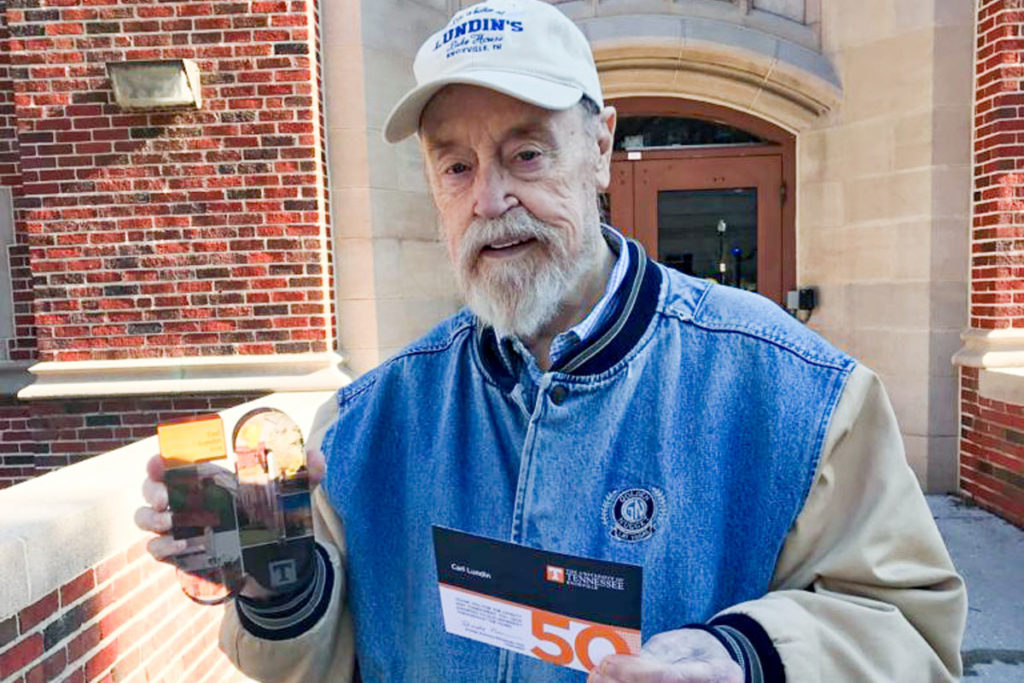Materials science and engineering Professor Carl Lundin passed away peacefully at his home on Tuesday, March 30, 2021, surrounded by family. He celebrated 50 years of teaching in 2018, and had recently retired from the university. He was 86 years-old.
“Dr. Lundin was an icon in the MSE department,” said Professor and Department Head Veerle Keppens. “His expertise in metallurgy and materials welding was heavily sought after by students and colleagues in academia and industry. It’s hard to imagine MSE without him.”
Lundin joined the UT faculty in 1968 as an associate professor. He established the Materials Joining Laboratory in what was then called the Department of Chemical and Metallurgical Engineering, the precursor to MSE. He was appointed full professor of metallurgy in 1975, a position he held for 45 years.
“I was deeply saddened to hear of Dr. Lundin’s passing,” said Frank Holiway, MSE accounting specialist. “Our offices were next door or across the hall from each other for over 30 years. ‘Doc’ reminded me very much of my father. Both were US Naval veterans and both had a no-nonsense, direct to the point personality. Doc demanded excellence and was able to transfer this to his students. Each of his students left being a better scholar, a better researcher, as well as a better person.”
Holiway recalled that Lundin showed his generous nature in the annual gift of a large ham to each staff member in MSE during the holidays.
“He was always there if he knew of someone in need,” added Holiway. “I feel honored that I knew him and called him my friend.”
Close to 100 graduate students and visiting professors from around the world have performed research in Lundin’s laboratory. resulting in more than 535 technical publications in materials joining and metallurgy. Under his leadership, the research grew beyond his lab, leading to graduate educational courses in materials joining and metallurgy being offered at ORNL and the former combustion engineering plant in Chattanooga.
“I had the privilege of working with Doc on many interesting projects over the years, from all over the world,” said Doug Fielden, technical supervisor in MSE’s Mechanical Systems Group. “A world renown researcher, he was a person that expected excellence in work from his students and staff.”
Fielden says he learned much from Lundin about techniques for joining different materials—and also about sharing one’s viewpoint on various projects.
“If you had an opinion about the issue at hand, one should be ready to defend that opinion or receive the ‘wrath of Doc,’” said Fielden. “I did not always agree with him, but I always found him fair. He was a great supporter of the Mechanical Systems shop and I considered him a person I could count on to speak at levels in the college where we had no voice.”
During his tenure in MSE, Lundin taught metallurgy, materials science, and materials joining classes, and became known as the department’s welding and metallurgy specialist. His world-renowned research and expertise in failure analysis also led to him serving as an industrial consultant to government agencies and the private sector since 1966.
“I have known Professor Lundin’s excellent reputation on welding since I was at the Westinghouse Research and Development Center (1980-1993) in, Pittsburgh,” said MSE Professor Peter Liaw, who worked with Lundin in recent years on the welding of high-entropy alloys. “He gave excellent TMS (The Minerals, Metals, and Materials Society) lectures on this topic.”
Lundin loved teaching and engineering and earned numerous awards, honors, and recognitions throughout his career. He was named the Tennessee Tomorrow Professor for his contributions to excellence in the college, Magnavox Professor of Engineering for his excellence in engineering teaching and research. He earned the UT Chancellor’s Research and Creative Achievement Award in 1992, and the Tickle College of Engineering Outstanding Teaching Award in 2000.
He belonged to multiple professional organizations and held various leadership positions. In 1986, he was named a Fellow of the American Society for Materials and a Charter Fellow of the American Welding Society in 1991, both appointments recognizing his significant research contributions to the science of welding, joining, and fabrication of materials.
In 2010, Lundin received the E.O. Paton Award from the International Institute of Welding for his lifetime achievements in the welding metallurgy and welding process fields. In 2012, he presented the prestigious Houdremont Lecture at the International Institute of Welding Annual Conference, and in 2013 was chosen as the AWS District 8 Educator of the Year.
Lundin attended Rensselaer Polytechnic Institute on a Navy ROTC Scholarship, and graduated with a bachelor’s degree in metallurgical engineering in 1957. After that, he served three years of active duty in the US Navy as a lieutenant before returning to Rensselaer and completing his Doctorate in materials science and engineering in October 1966. He was appointed an assistant professor in Rensselaer’s materials division and continued as supervisor of welding research before coming to UT.
Carl enjoyed spending time with his children and grandchildren at his home on Fort Loudoun Lake, along with fishing and farming. He had a deep appreciation for the arts and for world travel, especially his many trips to France.
Contributions can be made in memoriam to the Carl D. Lundin Scholarship Endowment for the Department of Materials Science and Engineering at the University of Tennessee, Knoxville. Checks should be made payable to: The University of Tennessee Foundation, Inc. A note on the memo line of the check or an included note should indicate the check is for the Carl Lundin Scholarship Endowment.
Donations should be sent to: Engineering Development, 118 Perkins Hall, Knoxville, TN 37996-2012. Visit the Engineering Development website for more information.
